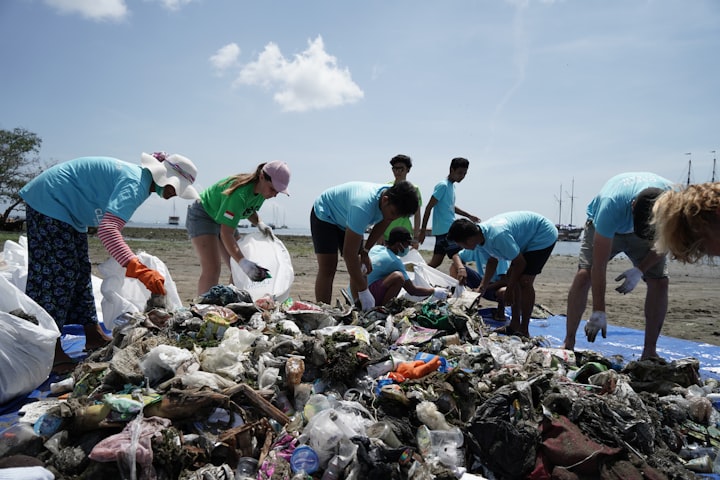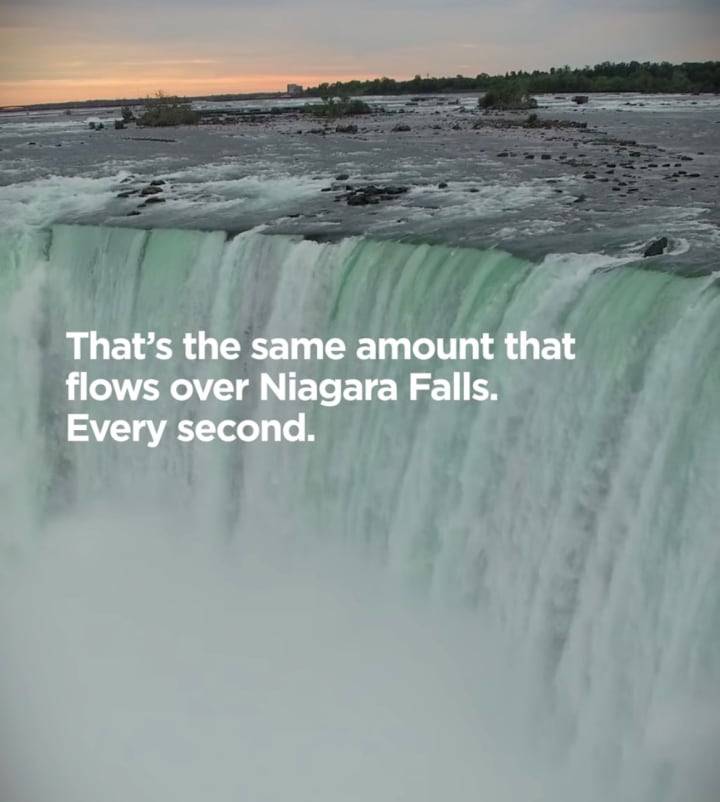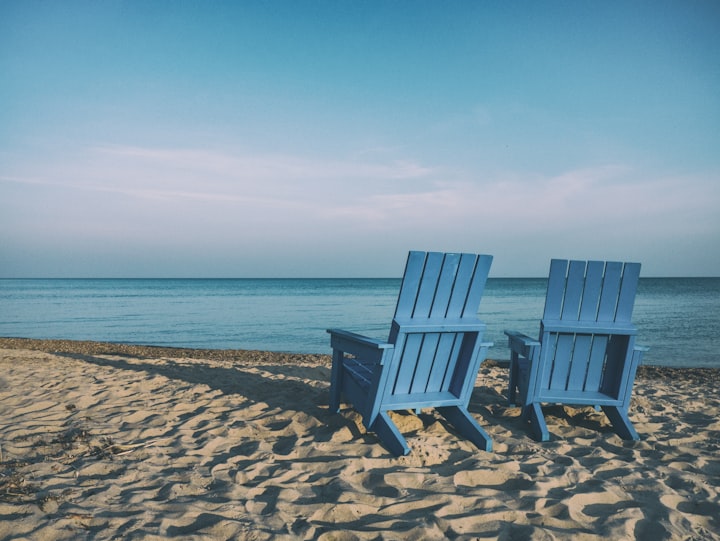There is no 2.0 Earth!
“We do not inherit the Earth from our ancestors, we borrow it from our children.” - Source unknown

Reduce, Reuse and Save Money!
Everyone knows about reducing their single use plastic items, just like they know to wash and reuse them if they are still in good condition. This is especially true for plastic bags from stores and plastic silverware. I usually reuse my grocery bags as thrash can bags if there is no hole in the bottom. The holes for the opening and the handles don’t count!
Did you know you could also reuse your Ziploc type of bags as well? It will save you a lot of money in exchange for a bit of work. You will get value for your hard-earned money! Heck! If my millionaire uncle can wash his bags, I certainly can do the same! I also keep the plastic bags from fruits, veggies and breads to use to discard messy food or non-edible part of fruits and veggies like carrots' peels, seeds from a pepper or leftover stuff from juicing fruits and vegetables. It makes the collector clean-up so much easier.
However, reducing, and reusing products goes well beyond these small actions. Instead of cling wrap, I use wax covers that my friend makes. They are also available on the net. They are typically made of beeswax. You can purchase stainless steel straws, straight or bent, of various size. Just make sure they have a silicon end where you put your lips otherwise your drink will feel terribly cold or hot!
These days, many companies offer green alternative cleaning products. They have less chemicals, lesser fillers, no phosphates and are biodegradable. You even get to reuse the bottles to clean with; you only need to purchase the refill option, which is cheaper. You know when you walk the cleaning and laundry aisles at the grocery store, and you can smell all the products? That phenomena is known as outgassing. You smell all those chemicals that are not good for your health and your lungs. When you spread those chemicals in your home and in your clothes, it seeps into your body slowly. For example, you are changing your baby on the changing table. After you are done, you use one of those commercialized wipes and clean the plastic mattress to disinfect the surface. That is fine. What is not fine is when you put your baby down on his bare back onto that mattress. The particles of chemicals which are left behind on the mattress exceed the safety limit recommended by Health Agencies and CDC. Those particles soak into your baby’s skin in less than 26 seconds! And we wonder why our kids have allergies!
Environment conscious companies offer reusable napkins, cotton period panties, mesh bags for fruits and vegetables, interchangeable heads for toothbrushes (instead of buying a whole new toothbrush), biodegradables silverware, paper straws, cleaning cloths, cotton make up remover pads, among others. You can convert almost all your single use items in your house by switching companies. Sure, there is an initial investment, but it does pay in the long run. Some companies even use a molten silver technology embedded in the fibers of cloths so it will self-clean. Some companies use mechanical cleaning to get rid of bacteria laying around on surfaces in your house. And they do it with water alone! Getting rid of toilet paper is a bit more challenging. It involves buying a bidet that can be attached to your toilet seat and connects to the water supply from the sink. They even have color coded bamboo towels to wipe yourself once all rinsed off to make sure you don’t use someone else’s towel by mistake! That is my next environmental upgrade.
Thrift Shopping
Fast fashion is very detrimental to our planet. Buy, wear, discard, repeat. Not only are you throwing your money away, but you are also throwing your cheap clothes away and wasting the Earth’s resources for a season. It is not sustainable! It costs a lot of money! The wealthier the people, the better the stuff they discard easily. When the pandemic is over, do garage sales. Go thrift shopping! Take hand me downs especially for young kids: they outgrown their clothes so fast! And return the favor by giving it away to someone else who needs them. While thrift shopping, my friend found a pair of ski pants, hardly used, worth over $200 for $20! All that extra income you just saved! And her daughter had stylish pants for downhill skiing on top of that! I found a brand cardigan that I was eyeing at a shop that was worth $125 brand new and I snatched it for $15! I washed it and I still wear it! It’s just like Macklemore and Ryan Lewis’ song Thrift Shop:
“Yo, that's fifty dollars for a t-shirt!"
Limited edition, let's do some simple addition
Fifty dollars for a t-shirt, that's just some ignorant b*tch sh*t!
I call that getting swindled and pimped!” – Songwriters: Ben Haggerty and Ryan S. Lewis
I call that swindling and pimping our planet!
“I call that getting tricked by a business.” - Ibid
I call that getting tricked out of my hard-earned money by a greedy business.
Did you know that if you invest in higher quality clothes and take care of them, they will last you several years? And it will save a lot of water too!


Therefore, it is much better to buy higher quality clothes that will save you money and last you at least a few years. Nobody needs more than 3 pairs of jeans! You always wear your favorite ones anyway!
Reduce carbon footprint
What is a carbon footprint? It’s the amount of CO and CO2 that are released in the atmosphere caused by one’s activity of using fossil fuels and coal. The gasses build up into the atmosphere and create a hot house effect, thus capturing and trapping the sun rays into the atmosphere. As a result, global temperature of continents and oceans rise. Icebergs melts. It creates smog if the concentration is high enough. Then, the UV index gets higher, and people get more easily sunburnt.
Here are some suggestions to limit your carbon footprint. Insulate your house. Retaining the heat or coolness of your home is essential to use less energy and to release less heat into the atmosphere. Use LED lighting. The power consumption of those light bulbs if a fraction to the Edison type of lightbulbs. Turn the power off your electronics when not in use; they produce lots of heat. Use a programmable thermometer so you don’t have to use the AC all day to have a cool house when you get home at 5 pm. Turning on the AC at 4pm will be enough to cool down your home.
Transportation wise, use your feet or a pedal bike. No carbon footprint there! Plus, it helps with maintaining a healthy weight and a good mental state. Next would be to use public transportation or an electric vehicle. In colder areas, hybrids might be more reliable should something unexpected happens on your way and you use up all your batteries’ energy. Also, support locally farmed food. The transportation to the farm to the table is closer, reducing the carbon footprint.
Support clean, green, and renewable energies such as solar and wind energies. There are also some energies that can be harvested from tides on the oceans. Although, be mindful of the wilderness: it is their home! It must not interfere with migration routes or spawning areas.
Feast for Crows and composting
I live in a city where composting is not organized by the city. Homeowners can buy the composter and do their own but since I live in a condo, there is no place for such an installation. Therefore, I feed my crows. They will eat almost anything. They refuse to eat fruits and vegetables. They are picky as well! They prefer old meat and fatty grains such as buttered bread or pasta with alfredo sauce. I’m sure they eat cheese, but I haven’t had the opportunity to give them some. This is my own way of composting. You can also save eggshells and mix them with the earth of your garden, use coffee grinds as a repellent for some insects as well.
Water: Our most valuable resource
Without water, there is no life. Without fresh water, human population will decrease drastically. There is only so much water in fruits, wines, and other alcoholic beverages.
Water consumption can easily be reduced by having low flow toilets, restrictors on shower heads and taps. Invest in a refrigerator that dispenses water and ice; use a reusable bottle to carry water around instead of buying bottled water. Wash in cold water and use the right amount of water for your load of laundry. Use a clothesline to dry, if possible! Use biodegradable products to wash your clothes and your dishes. It is important for them to be phosphate free. Use healthy, biodegradable skin products to clean yourself and your hair. If you can, take a shower every two or three days, or just quickly wash your body without washing your hair every day. Over washing the skin and hair strips them of their natural oils and biolayers.
In agriculture, use hydroponics. Build up instead of spreading out the hot houses. Use sustainable and renewable energy sources and practices to produce food.
Invest in companies who filter water, who can desalt ocean water as well. Don’t wait for governments to make the right decisions. Support companies that reduce climate change. Lead by example. It is time to reconfigure our economy: where a healthy planet is more important than money.

As for the ocean, we must stop the massive dumping of waste and chemical products in it. We must clean up the Great Pacific Garbage patch which is 1.6 million square kilometers or twice the size Texas. There are four more similar patches around the world: one in each ocean, albeit The Pacific one is the biggest. These patches are made mostly of fishing nets and plastics. Microplastics are the worst, so do not buy products that uses them. The plastic in the ocean is not only on its surface, but well below it, down to the abyss of the ocean.

Here is more info about plastic pollution in our oceans:
Another threat to oceans is fish farms where too many fish are crammed in the farm. They pollute the surrounding water area with feces and bacteria which sickened the wild population. Often, these farms are in proximity of migration routes of the wild species, such as Sockeye salmon in B.C., Canada. The wild salmon catches the diseases and die or can’t make it to their spawning area.
Engagement and Political Action
As one tiny person among billions of people, you can still have a greater impact par signing petitions, donating to environmental charities and lobbyists. You can vote for the “greenest” party. You can call your representative, start an ecology club to promote a healthy Earth. You can join rallies, but I do not recommend it during a pandemic. You can volunteer for your charitable causes et take part in clean-up programs. You can adopt a highway, where you pick up the litter along a certain route. Every little bit that you do, be at home or in the community, helps. If everyone does their share, the Earth will become a better place for it.
Towards a Humanity Unity
With the Coronavirus International passport being discuss, we are one step closer to seeing all humans as equals. When you see people like Elon Musk label their products: Made on Earth, there is an awakening as a whole specie. When people take pride in their neighborhoods like they did in 2016 in Rio De Janeiro, where they cleaned plastic and garbage laden waterways before the Olympics, it gives hope. Now, there are some massive beaches clean up going on in Peru. Make your part, however small it may be; it all adds up.
About the Creator
Sylvie Gagné
I’m a high school teacher in a French Catholic board in Ontario, Canada.
I love traveling, cooking and listening to music.
I’ve always had a very imaginative mind since I was a child.






Comments
There are no comments for this story
Be the first to respond and start the conversation.